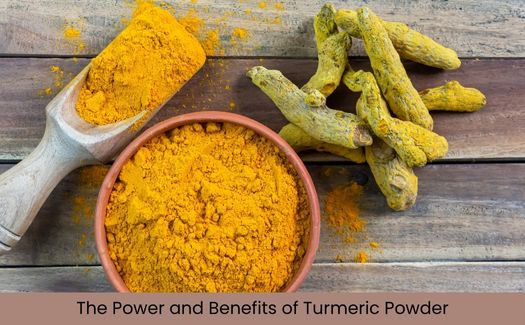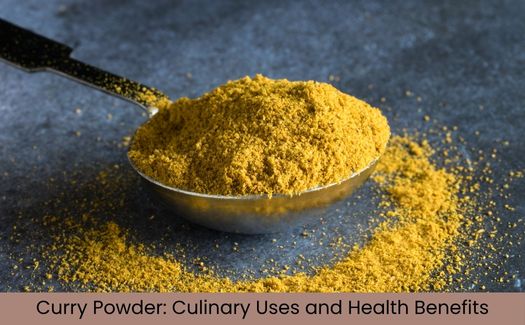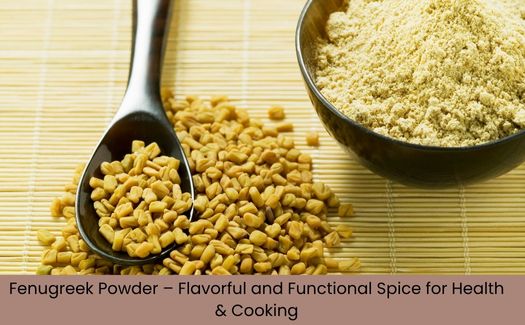Objective
The objective of this article is to highlight the top 10 essential ground spices that no kitchen should be without. It aims to help readers understand how each spice enhances flavor, aroma, and nutritional value in cooking. Additionally, this guide explains the culinary uses and health benefits of each spice—helping home cooks, chefs, and food enthusiasts make better seasoning choices while boosting wellness naturally.
Introduction
Ground spices are the foundation of every flavorful meal. They not only bring color and aroma to food but also contribute powerful health-promoting properties derived from natural plant compounds. From the fiery heat of Chilli Powder to the earthy warmth of Turmeric Powder and the sweet aroma of Cinnamon Powder, these staples transform ordinary dishes into culinary delights.
Here’s a curated list of the Top 10 Ground Spices Every Kitchen Should Have — with their culinary importance and unique health benefits.
Chilli Powder – The Spice of Heat and Color
Culinary Uses of Chilli Powder:
Chilli Powder is a universal seasoning that adds vibrant red color and a bold, spicy kick to curries, marinades, stir-fries, and snack mixes. It’s commonly used in Indian, Mexican, and Thai cuisines for its heat and flavor depth.
Chilli Powder Health Benefits:
- Contains capsaicin, which boosts metabolism and aids fat burning.
- Promotes better digestion and improves blood circulation.
- Rich in vitamin C and antioxidants for immune support.
Chilli Powder Tip: Use in moderation — a small pinch of Chilli Powder can dramatically elevate flavor without overpowering the dish.
Turmeric Powder – The Golden Healer
Culinary Uses of Turmeric Powder:
Known as the “Golden Spice,” Turmeric Powder is an essential ingredient in almost every curry, soup, and rice dish. It adds a deep golden color and earthy flavor that balances spicy and savory notes.
Turmeric Powder Health Benefits:
- Contains curcumin, a potent anti-inflammatory and antioxidant compound.
- Supports liver detoxification and immune health.
- Helps in joint flexibility and reducing inflammation.
Turmeric Powder Tip: Pair Turmeric Powder with black pepper to enhance curcumin absorption in the body.

Coriander Powder – The Aroma of Freshness
Culinary Uses of Coriander Powder :
Made from ground coriander seeds, Coriander Powder imparts a mild citrusy and nutty aroma that balances spicy dishes. It’s a staple in Indian curries, lentil soups, and vegetable gravies.
Coriander Powder Health Benefits:
- Promotes digestion and helps reduce bloating.
- Acts as a natural detoxifier for the body.
- Contains immune-boosting antioxidants.
Coriander Powder Tip: Add Coriander Powder toward the end of cooking to retain its fresh aroma and subtle sweetness.
Cinnamon Powder – The Sweet Spice of Comfort
Culinary Uses of Cinnamon Powder:
Cinnamon Powder lends a warm, sweet, and woody flavor to baked goods, desserts, teas, and even savory stews. It is a favorite spice for spiced beverages and festive recipes.
Cinnamon Powder Health Benefits:
- Helps regulate blood sugar levels and improve insulin sensitivity.
- Has antibacterial and anti-inflammatory properties.
- Supports heart health by lowering cholesterol.
Cinnamon Powder Tip: Sprinkle Cinnamon Powder on oatmeal, smoothies, or coffee for a natural sweetness without sugar.
Clove Powder – The Strong Aromatic Enhancer
Culinary Uses of Clove Powder:
Clove Powder is prized for its intense aroma and warming flavor. It’s commonly used in curries, spice blends, baked desserts, and beverages like masala tea or mulled wine.
Clove Powder Health Benefits:
- Rich in eugenol, which provides antibacterial and analgesic benefits.
- Aids in digestion and relieves respiratory discomfort.
- Supports oral health and reduces inflammation.
Clove Powder Tip: Use sparingly – Clove Powder is highly potent and can easily overpower mild flavors.
Cumin Powder – The Earthy Balance
Culinary Uses of Cumin Powder:
Cumin Powder delivers a deep, earthy, and nutty flavor that forms the base of countless global recipes — from Indian curries and Mexican tacos to Middle Eastern kebabs and soups.
Cumin Powder Health Benefits:
- Enhances digestion and nutrient absorption.
- Supports metabolism and reduces bloating.
- Rich in iron and antioxidants.
Cumin Powder Tip: Toast cumin seeds before grinding to create fresh Cumin Powder with a stronger aroma and flavor.

Curry Powder – The Perfect Blend of Flavors
Culinary Uses of Curry Powder:
Curry Powder is a versatile blend combining spices like turmeric, coriander, cumin, fenugreek, and chili. It brings a balanced and aromatic complexity to gravies, rice dishes, soups, and marinades.
Curry Powder Health Benefits:
- Combines multiple spices rich in antioxidants.
- Supports digestion and boosts immunity.
- Contains anti-inflammatory properties from turmeric and ginger.
Curry Powder Tip: Use Curry Powder in coconut-based sauces or lentil stews for authentic flavor and depth.
Fennel Powder - The Cooling Sweetness
Culinary Uses of Fennel Powder:
With a natural sweetness and mild licorice-like flavor, Fennel Powder enhances both savory and sweet dishes. It’s often added to spice blends, teas, and baked goods.
Fennel Powder Health Benefits:
- Soothes the digestive system and reduces acidity.
- Acts as a natural mouth freshener.
- Rich in dietary fiber and antioxidants.
Fennel Powder Tip: Add Fennel Powder to curries and breads for a refreshing aroma and digestive benefits.
Fenugreek Powder – The Flavor of Warm Bitterness
Culinary Uses of Fenugreek Powder:
Fenugreek Powder adds a distinctive, slightly bitter flavor that deepens the complexity of curries, sauces, and spice rubs. It’s essential in Indian masalas and pickling blends.
Fenugreek Powder Health Benefits:
- Helps control blood sugar and cholesterol levels.
- Promotes lactation and hormone balance.
- Supports digestion and reduces inflammation.
Fenugreek Powder Tip: Lightly roast Fenugreek Powder before adding it to recipes to mellow its bitterness and bring out its nutty tones.

Ginger Powder – The Zesty Reviver
Culinary Uses of Ginger Powder:
Ginger Powder brings warm, spicy, and slightly sweet notes to both savory and sweet dishes. It’s used in soups, curries, cookies, teas, and health drinks.
Ginger Powder Health Benefits:
- Aids digestion and relieves nausea.
- Helps fight inflammation and colds.
- Boosts immunity and metabolism.
Ginger Powder Tip: Combine Ginger Powder with honey and warm water as a natural remedy for sore throat and immunity boost.
Conclusion
Every spice in this list – from Chilli Powder’s fiery heat to Cinnamon Powder’s soothing sweetness – adds unique depth to cooking and health. These ten essential ground spices form the core of a well-stocked kitchen, offering endless flavor combinations and nutritional advantages.
To make the most of them, always store spices in airtight containers, away from moisture and sunlight, and buy in small batches to maintain freshness and potency. Whether you’re a home cook or a professional chef, these timeless spices are your secret to crafting delicious, aromatic, and wholesome meals every day.
FAQs About Ground Spices
How should I store ground spices for maximum freshness?
Store them in airtight containers, away from sunlight and moisture, to preserve flavor and aroma for up to 12 months.
Can I make ground spices at home?
Yes. Toast whole spices lightly and grind them to create fresh, aromatic powders without additives.
Which ground spice has the most health benefits?
Turmeric Powder and Ginger Powder are especially valued for their anti-inflammatory and immune-boosting properties.
What’s the difference between Curry Powder and Garam Masala?
Curry Powder is a pre-mixed seasoning with turmeric, cumin, and coriander, while Garam Masala is a blend of warming spices added at the end of cooking for aroma.
How can I tell if my ground spices have expired?
Faded color, weak aroma, and clumping are signs that the spices have lost potency and should be replaced.

